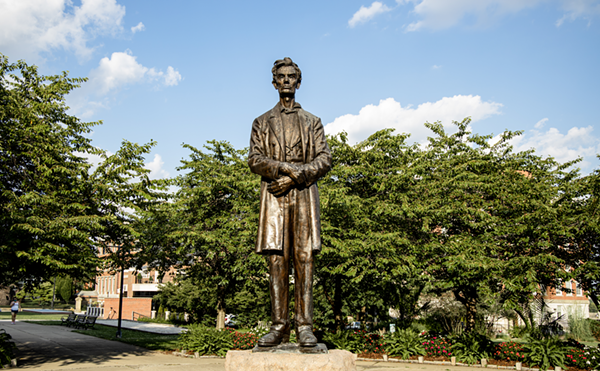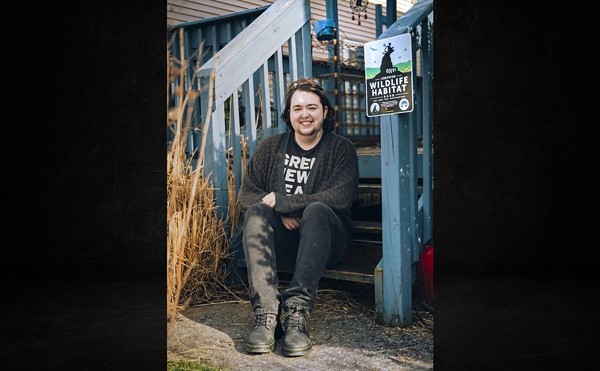"I don't care if you fall down! Make it interesting!"
You might not expect to hear these words from a classical ballet instructor, but the celebrated Suzanne Farrell is no ordinary teacher — and by all accounts she was nothing short of extraordinary as a dancer as well.
Farrell made this comment to aspiring young ballet students as they fought to pull off a precarious balance during her recent master class at Cincinnati Ballet. She encourages them to take risks, to live in the moment — something Farrell has embraced throughout her dancing career and her life.
Soon after she moved to the Big Apple at the tender age of 15 with a scholarship, she joined New York City Ballet and quickly became legendary choreographer George Balanchine's main muse. Her exceptionally long and storied career earned her a Presidential Medal of Honor in the Arts in 2003, Kennedy Center Honors in 2005 as well as widespread critical and popular fame.
Born in Mount Healthy as Roberta Sue Ficker, Farrell is spending time in her hometown for an unprecedented collaboration between Cincinnati Ballet and The Suzanne Farrell Ballet. The companies are teaming up to restage Balanchine's Chaconne, a technically challenging neoclassical work that debuted in 1976 with Farrell originating a principal role.
Later in November, the combined companies will also perform the piece at the Kennedy Center in Washington, D.C., where Farrell's company is based.
Farrell loves to teach, and she's pleased to be back in Cincinnati.
"Ballet is one of the few professions where you return, where you give back to people," she says. "You impart information; it's nothing you can really learn by video or technology. It's a real human being where you pass on from one human being to the next and it's very personal and very fragile."
Farrell possesses an ageless ballerina's delicate, fluid expressiveness offset by elegant, determined strength. Her azure doe-shaped eyes dance with delight, and her arms unfurl with unmistakable grace as she talks about teaching and collaborating.
"Everyone is working very hard and we're having fun," she says. "My dancers and your dancers and ballet dancers, we all are in service to the dance, so that gives us a commonality. But it's amazing — couple days ago we didn't know each other, and now it's like the culmination of something. It's very wonderful."
About feelings surrounding her experience in restaging Chaconne, she says, "Well, it's nice to rekindle those thoughts. I can't dance much anymore, but I still feel as though I can. I remember how it felt doing those things, but it's not emotional; I have no pangs of you know, wishing....
"If I could have danced forever I would have wanted to because there's nothing like it. But I can't dance like that anymore, and I had my time and now it's their time, so I'm very comfortable. I love working with them, all dancers. I think I love it because I'm not wishing I were out there doing it. You can only be one person and you can only be that person that one time in your life, so now you have to go on and do the best that you were as a dancer in the next phase of what you do."
Being yourself and alive in the moment resonates deeply with Farrell.
Many of the dancers have never seen Chaconne before. She says she'd rather not have them look at videos because she believes it should be them performing; they should come to life.
"Usually after they've learned the ballet, I might show it to the dancers, so they have something, but not to imitate," she says. "You need to be your own self, but the best complete self you can be."
As for advice she would give to dancers-to-be, Farrell says, "Listen to good music; it's what made me want to dance."
She also says you have to live in the moment and you have to learn something of that moment: how to perform a step — or how not to — not merely through repetition of what you've done the day before or the moment before, but to take chances to keep progressing.
"We don't have forever," Farrell says. "You can't take forever to learn something because your life as a dancer doesn't have forever. And your body is your instrument so you want to make sure that it doesn't take millions of times to do the steps before you understand it because you're using up your instrument. It's not like a piano you can put in a corner in a climate-controlled room and preserve it. Your body, every time you use it, it gets used. You can't recapture that again, so you need to learn quickly.
"Dance, ballet — good ballet — is the most alive way you can be as a human being. And I think dancers appreciate life more than most people for that reason."
I mention that, like life, dance is by its nature ephemeral.
"Yes. And you'll never have that moment again."





